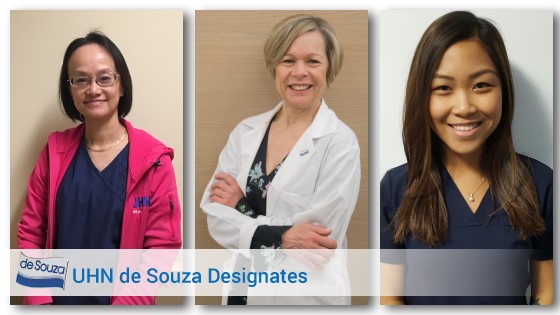#YESThisisNursing at UHN

No two days are ever the same for a nurse. Although they have their own routine, each day represents new patients, new challenges and new learning opportunities. Nurses are continuing to deal with the expanding traditional and non-traditional roles that they are expected to perform on every shift. How do nurses continue to do the exceptional and prepare for the changing nature of their profession? Three UHN nurses share their experiences on how de Souza Institute has helped them with their professional development.
As a Registered Nurse on the surgical unit at Toronto General Hospital, Wen Juan Huang began her de Souza Nurse Associate Designation when she realized there was a gap in the amount of emotional care that nurses are able to provide to patients. Wen believes the designation program helped her learn and grown as a nurse, both professionally and personally.
On Wen’s general surgery unit, the majority of patients are elderly and living with some form of cancer. These patients often stay on the unit for only 3 days. With sicker patients and shorter lengths of stay, Wen feels it is hard to get to know these patients, and answer their tough questions such as “what will happen after I leave?”
Wen’s experience with elderly, palliative patients in general surgery has shown her the importance of continuing education, especially in the areas of emotional care, and as they pertain to cultural sensitivity. When asked what she felt was important to providing nursing care on her unit, Wen responded with “it is important to take the time to answer your patient’s questions and talk to their family”. As a firm believer in providing emotional care, Wen is passionate about teaching and continuous learning.
Working in the General Internal Medicine Unit at Toronto Western Hospital, charge nurse Katrina Lazo delivers treatments and palliative care to an increasing number of geriatric patients with cancer. Katrina credits de Souza for enhancing her communications skills. The knowledge and techniques gained from taking the de Souza courses were quickly implemented into her daily routine. It boosted her confidence and improved her rapport with her patients, where she was now more comfortable to engage in sensitive conversations about death and dying. She says that although it still can be emotionally taxing to provide end-of-life care while managing a typical workload, you build versatility and a level of comfortability with each patient that welcomes you into their life.
As a young nurse, Katrina is already offering mentorship and guidance to her team and with the support of her colleagues she has effectively led many unit quality and safety initiatives. More recently, Katrina has participated in the process of medical assistance in dying, and will be presenting her MAID experience at this year’s UHN Nursing Forum.
Katrina stresses the importance of continuous learning, especially for young nurses, as medicine is constantly changing. Her advice for nurses looking to find the time for added training is to find a topic you are passionate about, and keep a work-life balance. Katrina believes that when you are balanced and rested, learning is much more manageable.
With over 38 years of experience, Pat Cotman currently works in the Gynecology and Breast Cancer outpatient clinics at the Princess Margaret Cancer Centre. After coming from a background working in clinical trials and drug development, Pat made the courageous move to return to nursing and active patient care. Entering the oncology field later in her career, Pat credits her confidence and success to her de Souza designation.
Pat describes the complexity, variety and number of patients as some of the greatest challenges of working in the largest cancer centre in Canada. She understands the importance of spending quality time with her patients and recognizes the reality that focused assessment and a strong knowledge base is essential to provided quality care. Her number one suggestion for nurses who are in the early stages of their careers is to work toward specialization and certification. Achieving the de Souza Nurse Designation is a manageable path and acknowledges your expertise in cancer care.
The de Souza Institute applauds all of the UHN nurses for the extraordinary work that they do on every shift and are proud to be a resource for their training, professional development and confidence.
#YesThisisNursing!
Visit our Designations page to learn more about how to become a de Souza designate.
